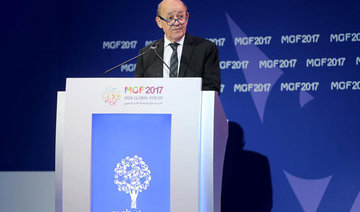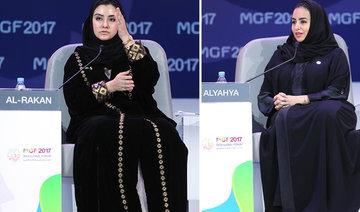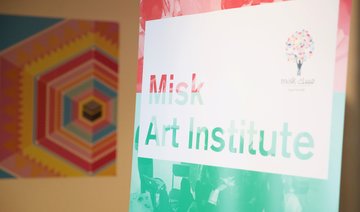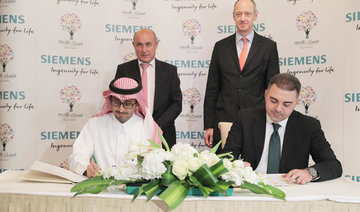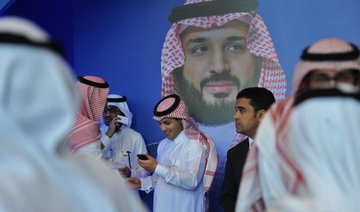RIYADH: While some see artificial intelligence as a leap to the next developmental stage for humankind, many people are worried about jobs, said Riad Hamade, executive editor for the Middle East and Africa, Bloomberg News.
The young generation now wonders what type of jobs they should be looking for, especially after talk of smart cities powered by robots became so relevant.
“Robotics and artificial intelligence have different meanings to different people,” said Esther Baldwin, artificial intelligence strategist for Intel.
She argued that artificial intelligence is “nothing new,” and that people have had degrees in this topic since the 1980s.
Baldwin was speaking on the first day of the MiSK Global Forum, which brings young leaders, creators and thinkers together with established innovators to explore ways to meet challenges of change.
“It’s only in recent research breakthroughs that have made more natural language processing possible, but robots seem to be a topic that engenders more fear that they will take people’s jobs away or they may be dangerous,” she said, adding that it is important to define what a robot is.
Baldwin, who has spent over 25 years at Intel, pointed out that robots can be anything from very small automated devices, all the way up to something that is much more sophisticated.
Addressing autonomous vehicles, Baldwin asked whether they can be counted as robots with humans inside them. “A human is now inside the autonomous vehicle and it is driving the person around. So, is that a robot?”
Seeing a robot walking around any time soon is still very unlikely, said William Tunstall-Pedoe, artificial intelligence entrepreneur formerly with Amazon Alexa.
With autonomous driving, said Tunstall-Pedoe, artificial intelligence does have an impact on jobs. “Autonomous cars are replacing the jobs of millions of people,” he said, adding that computers have started to do things that previously only the human brain could do.
Jobs will change once robots come along, but Hamade argued that “it is not like it is the first time in human history that industries have changed. The horse and carriage was a huge industry and then it disappeared.”
According to Hamade, agricultural jobs in the US have been declining for 170 years, and manufacturing jobs peaked in 1979 and have been declining ever since. “However, service jobs have been steadily rising for a very long time. So, what is the difference this time?”
“From the first industrial revolution until today, we have been talking about augmenting humans, making it easier for them to do their jobs,” said Baldwin, adding: “If you look at labor productivity, I don’t know anybody who is working fewer hours today than they did 10 or 15 years ago. Other than France, which has designated a shorter work week for people, most people are working the same number of hours, and so it is really a shift in what we are doing.”
Tunstall-Pedoe argued that the only difference between change in the 19th century/early 20th century and now is the pace of change. “I think there is plenty of evidence that the pace of change is increasing.”
It is not necessarily clear that new jobs will replace current jobs as happened in the past, as no one knows for sure what is going to happen, said Tunstall-Pedoe, who advised the young audience attending the forum that “the remedy is to keep learning, be part of this technological change and adapt to it, and continue to learn new skills so you don’t get left behind. Stay on top of technology, apply AI (artificial intelligence)to your existing business.”
He said that senior management jobs that involve complex management of people, evolved technologies and entrepreneurship are going to be the last ones to be replaced, contrary to the simpler jobs that will be among the first to be replaced.
Involving more people in coding and programing is not the answer, according to Baldwin.
“We already seeing applications where AI is doing coding. I trained as an engineer, and if I look at the advancements over the life of my career, I used to have to do manual drafting. I don’t have to do that anymore, because of high-performance computing and simulation.”
Engineers, she said, like to solve and frame problems, which is a “crucial” trait for which humans cannot be replaced.
“There are two things critical for success: Desire and opportunity,” she said, adding that “it is very apparent that the leaders of this country are providing the youth with opportunity. The question is — do the youth have the desire? And when you match these two together, you can only be successful.”
Artificial intelligence: Leap to next development stage or job threat?
Artificial intelligence: Leap to next development stage or job threat?
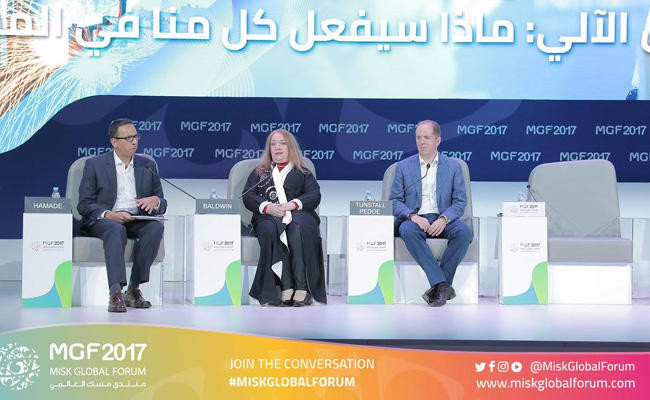
King Salman appoints Dr. Majid Al-Fayyad as advisor to the Saudi Royal Court

- Al-Fayyad has been executive general supervisor at King Faisal Specialist Hospital and Research Centre since 2017
- He graduated in 1990 from King Saud University’s medical school and has amassed decades of clinical, academic and administrative experience
JEDDAH: In a royal order issued on Wednesday, King Salman appointed Dr. Majid Al-Fayyad as an advisor to the Saudi Royal Court.
Al-Fayyad is the executive general supervisor at King Faisal Specialist Hospital and Research Centre, which has facilities in Riyadh, Madinah and Jeddah. He graduated in 1990 from the medical school at King Saud University in Riyadh, and has amassed decades of clinical, academic and administrative experience.
In the US, he undertook specialized training in pediatrics at Tufts University, and in pediatric cardiology at Columbia University. He holds several certifications and degrees, including a master’s in medical administration awarded by the University of Southern California in 2015.
He was appointed in 2017 to his current position at King Faisal Specialist Hospital, where he has helped spearhead key reforms to the Saudi healthcare sector. He has also played important roles in national healthcare committees and initiatives, earning recognition for his contributions to research and administration.
Saudi deputy FM receives UK ambassador in Riyadh

Saudi Deputy Minister for International Multilateral Affairs Abdulrahman Al-Rassi was visited by UK Ambassador to the Kingdom Neil Crompton in Riyadh on Wednesday.
The ambassador visited to bid farewell on the occasion of the end of his tenure in the Kingdom, the Foreign Ministry wrote in a post on X.
Al-Rassi praised the ambassador’s efforts in strengthening and advancing relations between the two countries.
Riyadh museum to host interactive camp for kids

JEDDAH: The National Museum in Riyadh will launch its third interactive summer camp, themed “Made in the Museum,” for children aged 10 to 12, the Saudi Press Agency reported.
The initiative is part of the “Year of Handicrafts,” celebrating Saudi Arabia’s cultural heritage and its role in shaping national identity and intergenerational bonds.
The camp has two sessions: July 21-31 and Aug. 4-14, running daily from 10 a.m. to 2:30 p.m., both inside the museum and outdoors.
Designed as an educational and immersive experience, the camp invites participants to explore and revive traditional Saudi crafts, the SPA added.
Children will engage in hands-on activities in four core tracks: clay crafts, textiles, woodworking, and supportive crafts, blending play, learning, and exploration.
This year’s camp strengthens the museum’s role as a community hub, providing children with opportunities to develop critical thinking and design skills while inspiring their imagination and showing the cultural and economic importance of handicrafts.
The camp encourages children to make and show their projects at the end of each session, helping them feel confident and encouraging new ideas and creativity.
Riyadh hospital succeeds in rare disease treatment

- The hospital has provided 22 years of care for a patient with a rare genetic blood clotting disorder, culminating in a successful liver transplant — the first worldwide for this condition
RIYADH: King Faisal Specialist Hospital and Research Center in Riyadh has provided 22 years of care for a patient with a rare genetic blood clotting disorder, culminating in a successful liver transplant — the first worldwide for this condition.
Diagnosed in infancy with congenital plasminogen deficiency, the patient required ongoing treatment to manage fibrous deposits affecting her tissues and organs, according to a press release.
Over the two decades, a multidisciplinary team including hematology, transplant specialists, nursing, nutrition and IT supported her care, the report said.
The patient’s father said: “She suffered from birth and couldn’t nurse. We had no clear answers until we found hope through the care provided by the Saudi government. After 22 years of struggle, we witness our daughter’s recovery.”
The treatment involved regular plasminogen infusions and eyedrops to reduce the disease’s effect on her vision, with annual costs exceeding SR6 million ($1.6 million), fully covered by the government.
Dr. Hazzaa Al-Zahrani, director of the adult hematology and stem-cell transplant division at the center and supervising physician, said that managing the case required a precise and long-term approach to prevent complications and ensure stability.
He said that the decision to proceed with a liver transplant came after careful consideration as an extraordinary therapeutic option for this exceptionally rare case.
The procedure’s success marked a turning point in her medical journey and was a beacon of hope for patients with similar conditions worldwide, Al-Zahrani added.
Program to boost youth, SME role in Saudi economy

RIYADH: The Small and Medium Enterprises Loan Guarantee Program, known as Kafalah, in collaboration with the Riyadh Chamber, will hold interactive sessions on July 15 to mark World Youth Skills Day.
The initiative aims to raise awareness and develop entrepreneurial skills among youth, entrepreneurs and SMEs, the Saudi Press Agency reported on Wednesday.
The sessions will cover key topics to boost youth contributions to national economic development, in line with the Kingdom’s Vision 2030 reform plan.
Focus areas include access to finance, building administrative and financial capabilities, enhancing SME sustainability, and turning ideas into viable projects.
These sessions highlight the collaboration between entities supporting the SME sector in the Kingdom, the SPA added.
The Kafalah program and Riyadh Chamber aim to foster youth growth and strengthen their role in the national economy.
Kafalah supports micro, small and medium enterprises by providing financial guarantees, improving their access to financing and reducing lending risks for banks.


